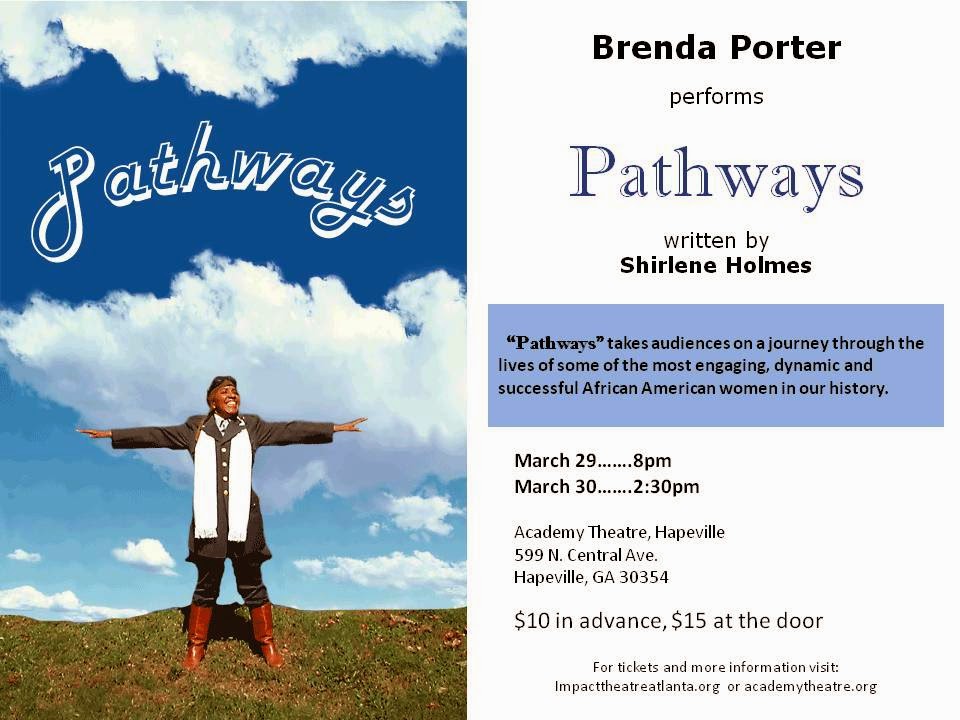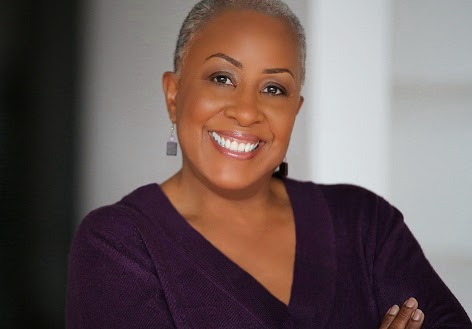
The Academy Theatre’s been up to some pretty exciting things since their move from Avondale Estates last year. With two new homes, one in Stockbridge and one in Hapeville, the iconic Atlanta theater is growing so fast it makes your head spin.
This weekend, they’re hosting a long-time Essential family member, Brenda Porter, as she performs the one-woman show, Pathways, written by Shirlene Holmes. Pathways takes audiences on a journey through the lives of some of the most engaging, dynamic and successful African American women in our history, women who have often been overlooked or marginalized by history text books. Sometimes funny, always daring, these stories are exciting, fun and inspiring for people of all ages.
You’ll get to know the engaging characters in this story when you see the show tonight or Sunday afternoon — which, having seen it, I highly recommend. Let’s take a moment now to hear Brenda’s story, bringing Pathways and Essential Theatre together.
What is your connection to Essential Theatre?
My connection with Essential Theatre began as so many others’ – with Peter Hardy. When I was just a wee lass, I worked one summer at Unto These Hills…Years later, I was honored to be asked by Betty Hart to do movement at Essential for Darker Face of the Earth by Rita Dove, which she was directing…And the rest is history!
How long have you been performing Pathways?
Over 12 years. Wow, time flies!
What is your connection to Shirlene Holmes?
We met in the early ’90s when I was cast in her show, A Lady and a Woman, which Carol Mitchell Leon directed at SAME Theatre, no longer in existence.
What are your feelings about this play? Why should people see it? Why should you be performing it?
While I was teaching a group of young girls many years ago, I asked my class to identify African American women of note. To my surprise, very few were named. Of course Harriet Tubman, but the remainder of the list included Janet Jackson and Salt and Pepper (both of whom had hits on the top ten chart at the time). The girls did better with African American males, naming Martin Luther King, Hank Aaron, Booker T. Washington, George Washington Carver and others. It was at that time that it became apparent to me that young African American girls were not being exposed to the people in their past that laid pathways for them to have the freedom and privileges that they now experience. At that moment the idea of Pathways was born.
 Brenda Porter has a degree in Drama from the University of Georgia and began her career as an actor over twenty-five years ago. Her stage credits include The Story, Wit, for colored girls…, The Art of Dining, So Long on Lonely Street, El Hajj Malik, Home, The miracle Worker, among others. She has appeared in television and directed staged productions as well over the years, and she currently co-facilitates The Practice, along with Jen Harper and Donna Biscoe. Brenda is teaching theatre this spring at KIPP South Fulton Academy. She presently serves as a Suzi Awards Board Member and is the Artistic Director of Impact Theater Atlanta.
Brenda Porter has a degree in Drama from the University of Georgia and began her career as an actor over twenty-five years ago. Her stage credits include The Story, Wit, for colored girls…, The Art of Dining, So Long on Lonely Street, El Hajj Malik, Home, The miracle Worker, among others. She has appeared in television and directed staged productions as well over the years, and she currently co-facilitates The Practice, along with Jen Harper and Donna Biscoe. Brenda is teaching theatre this spring at KIPP South Fulton Academy. She presently serves as a Suzi Awards Board Member and is the Artistic Director of Impact Theater Atlanta.

